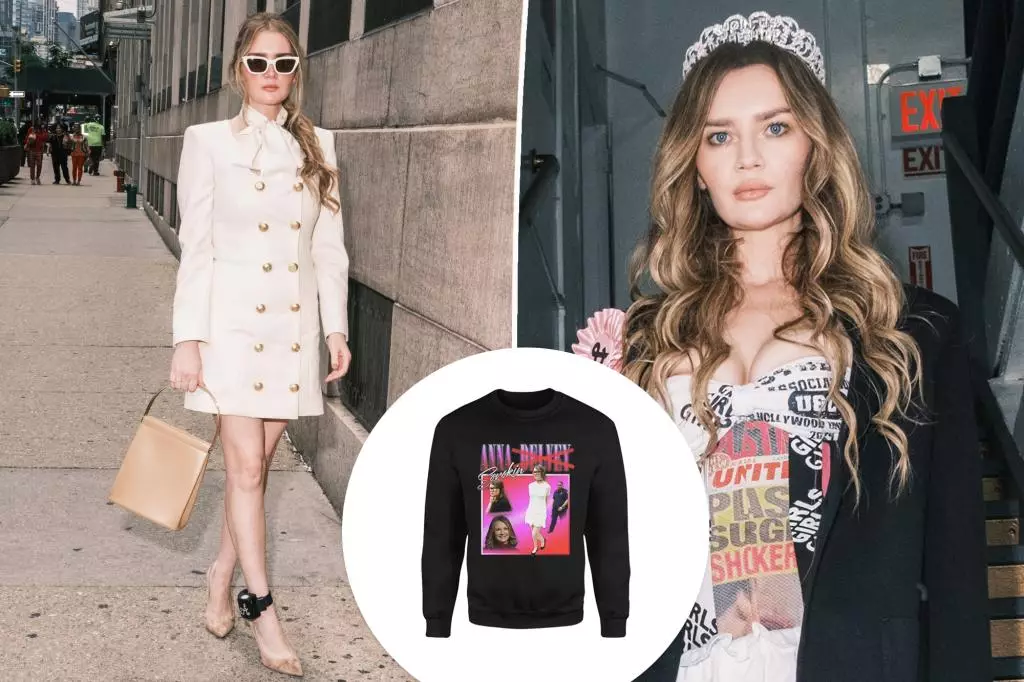Anna Sorokin, infamous for her audacious deception as Anna Delvey, captivated the public imagination by posing as a wealthy New York heiress. From 2013 to 2017, she orchestrated a series of fraudulent activities that resulted in her swindling over $250,000 from various businesses and individuals. Her reign of deception, which ultimately led to her conviction and imprisonment, has metamorphosed into a narrative of reinvention. Once released, she did not shun the spotlight; rather, she embraced it, associating her name with the fashion industry. This startling shift raises questions about the ethics of branding and identity in a society that often rewards notoriety.
In a bold move, Delvey trademarked her criminal alias prior to her release from prison, establishing the “Anna Delvey” brand under the Anya Delvey LLC. Officially registered with the United States Patent and Trademark Office in September 2022, the trademark spans a wide array of clothing items, ranging from dresses to hoodies. The timing of this trademark registration is particularly strategic; it came just as Delvey transitioned to her post-incarceration life. Such foresight is a testament to her understanding of the power of branding, especially in an era where personal narratives can be commodified and repackaged for profit.
The recent controversy unfolded when Walmart began selling merchandise donning Delvey’s name and likeness, including sweatshirts and T-shirts emblazoned with her image. In response, her legal representation promptly issued a cease-and-desist order, criticizing Walmart for what they termed “egregious infringement” of her federally registered trademark. This incident encapsulates the tensions that arise when commercial interests collide with personal branding, particularly in cases as contentious as Delvey’s.
Delvey’s attorney, Duncan Levin, emphasized the potentially detrimental impact of Walmart’s actions on her client’s brand and reputation, asserting that the high volume of infringing products on Walmart’s platforms could confuse consumers and degrade her carefully crafted image. The aftermath of this situation demonstrates just how fragile yet vital brand identity can be, particularly for individuals with controversial pasts seeking redemption and mainstream acceptance.
The cease-and-desist letter demanded immediate action from Walmart, including the removal of all infringing products and a comprehensive reckoning of sales associated with the trademark violation. This response is indicative of Delvey’s proactive strategy to exert control over her brand, ensuring that her narrative is shaped according to her specifications. Moreover, the potential for legal action if Walmart failed to comply illustrates the lengths to which she is willing to go to ensure her story and brand remain intact.
Alongside the trademark dispute, Delvey is on a broader legal offensive. Previously, she posed threats of litigation against “The View” after co-host Whoopi Goldberg made comments suggesting she owes restitution, despite Delvey’s claim that her debts have been settled. The dynamic of public persona and legal challenges surrounding her narrative provokes thought about societal accountability and the role of media in shaping the legacies of infamous figures.
As Delvey sets up her fashion public relations firm, the OutLaw Agency, with high-profile industry figures, it brings to light the unavoidable intersection of crime, social mobility, and commerce. Her story serves as a cautionary tale as well as an inspiration — illustrating how notoriety can transition into opportunity in today’s attention economy. Delvey’s resurgence in the fashion scene forces society to grapple with complex themes of redemption, authenticity, and the nature of success.
Anna Delvey’s evolution from con artist to an entrepreneur signifies not only a personal transformation but also poses critical questions about morality in brand identity and celebrity culture. As she navigates the legal labyrinth of her criminal past and the commercial prospects of her new brand, the world watches, fascinated by the blending of infamy with modern capitalism.

